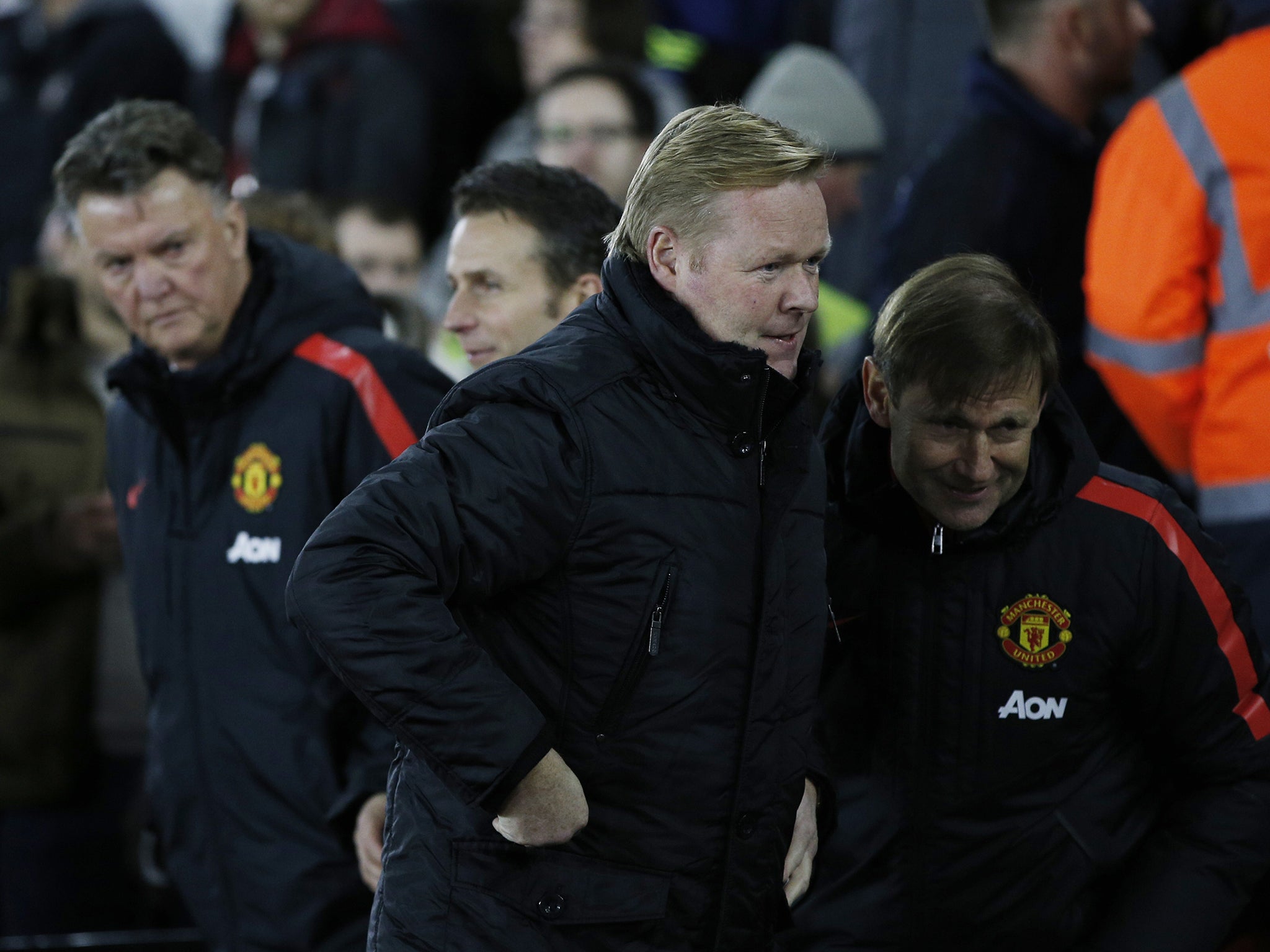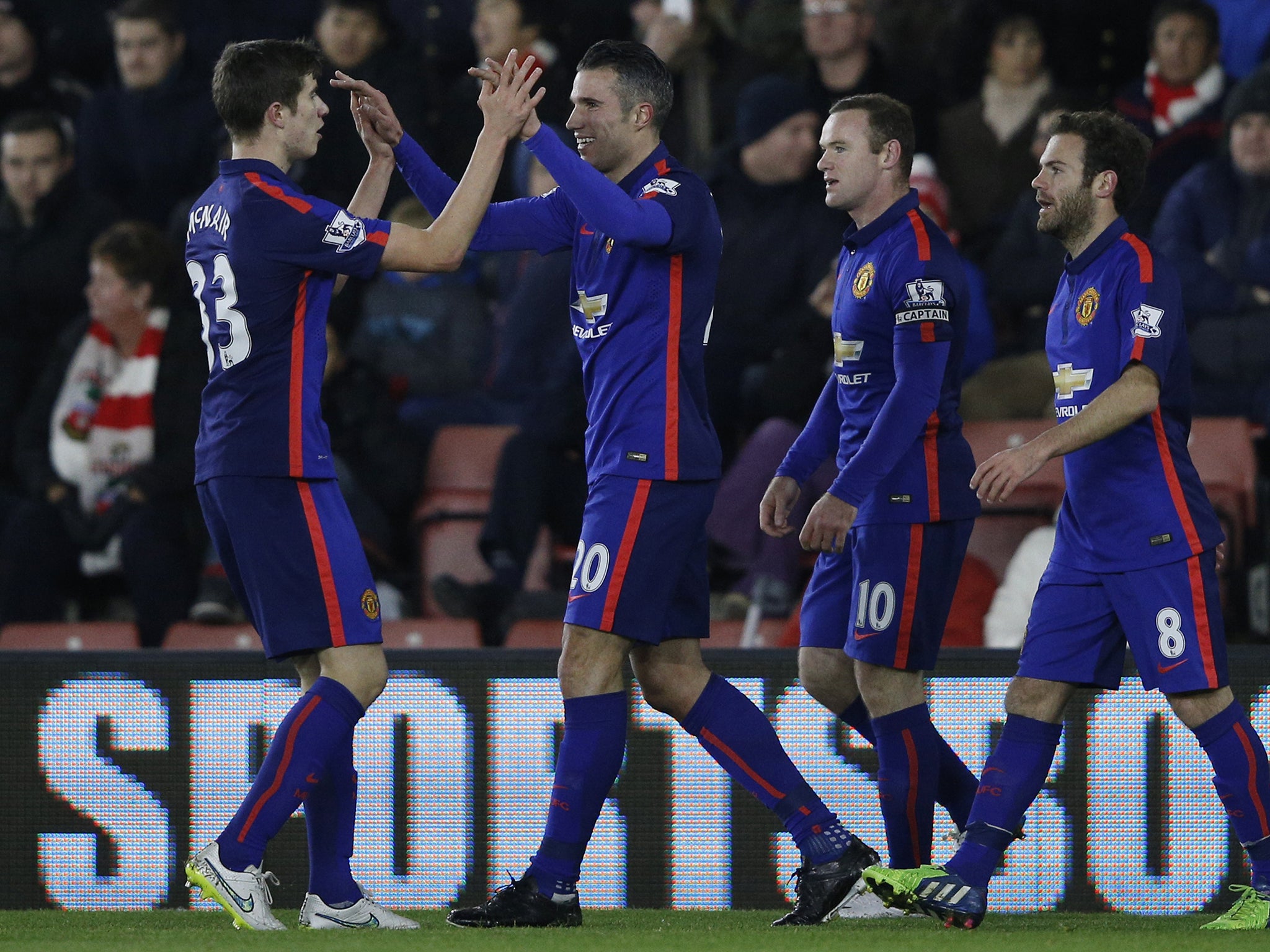Southampton 1 Manchester United 2 analysis: Louis van Gaal wins battle against Ronald Koeman but little total football in sight
Billed as a tussle between the Dutch masters, the match was not always a pretty picture

Your support helps us to tell the story
From reproductive rights to climate change to Big Tech, The Independent is on the ground when the story is developing. Whether it's investigating the financials of Elon Musk's pro-Trump PAC or producing our latest documentary, 'The A Word', which shines a light on the American women fighting for reproductive rights, we know how important it is to parse out the facts from the messaging.
At such a critical moment in US history, we need reporters on the ground. Your donation allows us to keep sending journalists to speak to both sides of the story.
The Independent is trusted by Americans across the entire political spectrum. And unlike many other quality news outlets, we choose not to lock Americans out of our reporting and analysis with paywalls. We believe quality journalism should be available to everyone, paid for by those who can afford it.
Your support makes all the difference.They shook hands, but the pleasantries were curt rather than affectionate, made all the more obvious by the warmth with which Ronald Koeman greeted Ryan Giggs. But that was expected because we all know by now Koeman and Louis van Gaal are not soul-mates. Not that this will have come as a surprise to anyone familiar with the Dutch game. The nation’s football folk are notoriously disputative and the pair’s friendship was never likely to survive working together as equals, which they did at Ajax a decade ago.
That propensity to conflict is, however, one of the reasons the Dutch have for so long punched above their weight. Bobby Robson recalled, when he went to PSV Eindhoven, that one of the first differences he noticed was Dutch players, when substituted, did not just sit down and sulk like English ones. They wanted to know why they had been replaced, and if it was for tactical reasons Robson had better be able to show they were valid.
The desire of Dutch footballers to know why and how is in keeping with a philosophy dating back to arguably the father of modern football. Voted Fifa’s coach of the century in 1999, Rinus Michels influenced a coaching line that runs through Johann Cruyff to Pep Guardiola, Brendan Rodgers, Roberto Martinez and many more disciples. It was Michels’ achievements, with the Netherlands teams of 1974 and 1988, Ajax and Barcelona, which launched the idea that the Dutch were brilliant coaches. They also speak near-perfect English.
So it is perhaps surprising, given the Premier League pays – a few superclubs aside – the highest managerial salaries in the world, that so few have worked in the competition. Then again, the ones that have done so have not been unalloyed successes.
Guus Hiddink won friends and trophies at Chelsea but Ruud Gullit had previously had mixed fortunes there followed by a bad time at Newcastle. Martin Jol had a respectable spell at Tottenham, being harshly sacked, but never quite got to grips with life at Fulham. His replacement, compatriot Rene Mulensteen, arrived with a glittering reputation as a coach, but was given only 75 days at Craven Cottage.
Southampton had had their own Dutch disappointments before hiring Koeman with neither Jan Poortvliet nor Mark Wotte able, in admittedly difficult circumstances, to prevent their slide down and out of the Championship. Five years on, and back in the top flight, they snapped up Koeman after Hiddink was preferred as the Oranje’s replacement for Van Gaal.
With the national side, Van Gaal had proved, at the World Cup, that while he may not like Koeman he admires his judgement, adopting the back three the younger man had instituted at Feyenoord.
He was at it again last night, in an unexpected homage, doggedly persisting even after Chris Smalling was injured and Paddy McNair’s inexperience exposed. Nor did the fact that Graziano Pelle, who played under both coaches in the Eredivisie, was able to bully all five of the centre-halves he found himself in contact with deter Van Gaal.

Playing three at the back helps Van Gaal get Wayne Rooney, Robin van Persie and Juan Mata into the same team, but that is largely irrelevant when the rest of the XI are so outplayed the golden trident never see the ball. Both Van Gaal and Koeman have won the Rinus Michels award, the prize given to the man voted by his peers the best coach in Dutch domestic football, but only Saints were playing anything approaching totaalvoetbal. But for Jose Fonte’s gift and Saints’ hesitancy around the box, the game would have been settled by the break.
Instead, the big men from the low country came out for round two. Koeman prowled the touchline, urging his team on, Van Gaal sat hunched against the cold, his notebook on his lap like a comfort blanket.
He was off the bench quickly enough when the third Dutchman in the narrative scored his second. Van Gaal punched the air, then his eyes darted in Koeman’s direction, a trace of smugness within. Cruyff said when Michels died, “With him, results came first, but quality of soccer was No 1.” Last night, Koeman’s team had the quality, but Van Gaal’s got the result.
Join our commenting forum
Join thought-provoking conversations, follow other Independent readers and see their replies
Comments